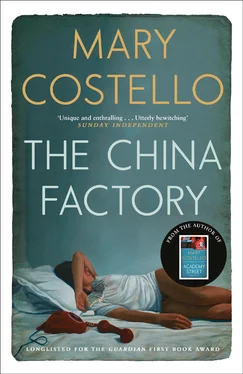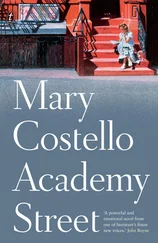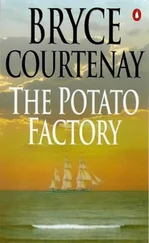‘Do you remember what Miriam used to call us?’ he asks.
She lifts her cup and looks at him.
‘She used to call us swans,’ he says.
‘Did you not hear what I said? Kathy said you’re to go up and see Dr O’Byrne.’ She puts the cup down and looks away.
They were all there at the dinner table one Sunday after James’s wedding, fifteen years ago, and the talk turned to marriage and Miriam came out with it: There aren’t many swans left anymore. Like Mam and Dad… mating for life . When he was a young man he stood in the turlough field one evening watching the swans that came to winter on his lough. They were hard and brutish. He remembered a story from national school, the Children of Lir, three brothers and a sister who were turned into swans for five hundred years. The swans in his school book were lovely creatures. He stood back from the water that evening, from the swallow holes that could suck an animal underground and drag it through channels that flowed down from the bog. He was afraid of the pull of water. There was something in him and he thought the water knew it. The swans rose that evening and passed over his head. He turned around and saw a lone tree, and its bare branches against the sky nearly broke him.
‘You might do that run yourself,’ he says.
‘Sure we can go together.’
‘It’s a wonder she didn’t tell you the results over the phone.’
‘They never do that. The doctor has to see you himself.’
‘There must be something wrong,’ he says. ‘They’d tell you if there wasn’t.’
‘Ah, no, not necessarily. It might be something small, some small irregularity… like that thyroid problem Pádraig had… Do you remember — he was feeling terrible for months before they got to the bottom of it?’
‘It’s not some small irregularity.’
The clock ticks on the wall behind her. He never forgets that she is here. She looks out the window. She has a way of being distant that makes him think he is already invisible. One day at the dinner she turned to him and said ‘Can you not chew any quieter?’ In winter her eyes are bluer — he used think the cold got in. A frown gathers on her brow now. Once, he knew all that went on behind that brow. Once she had been as delicate as a sparrow in his hands. He had called her My little one and almost died with the need to be near her.
The sickness has been inside him for months. In early spring he walked through the land, going deeper into the fields to the last hill. He moved up the slope and stood on the summit and was caught suddenly by the ground shifting. He began to list as if on a ship. He turned his head and saw the dark mouths of foxes’ dens along the ditch. Once, when he was baling hay late on a summer’s evening he saw a vixen approach her den. A clutch of young cubs peeped out, anxious, and at the sight of the mother, came scrambling over each other, not orphaned after all. He imagined them all moving underneath him now, loosening the earth, tumbling through dark tunnels — a teeming world of foxes inside the hill. In winter they’d sleep, curled in a tight circle. The hill began to pitch that day and the sky spun. The bile rose up and he retched onto the summit. He longed for the cover of trees then, to stand under the beech tree and feel rain falling on the leaves. He thought of small birds sheltering under their canopy and when the rain stopped, the sound of rainwater trickling down pipes.
Marie is standing in the middle of the kitchen looking up. ‘Those damn flies,’ she says. The flies circle around the light fitting. She goes to the cupboard and brings out a spray can. She comes at them and aims, and they dart about drunkenly in the poison mist.
‘Wouldn’t it be an ease if we had it all behind us?’ he says. He means dying. He knew a man once who took his own life. He parked his car at the crossroads on Christmas Eve and switched off the engine and blew his head off with a shot gun. He had left his wife and four kids at the church for Midnight Mass. Marie and himself were at Midnight Mass the same night.
The black kitten jumps off the windowsill. ‘Stop that talk,’ she says and goes to the back door.
On a summer’s evening when he was thirty he had found her. He had walked across a wooden dance floor under a tarpaulin marquee and stood before her, as if she had sent out a call to him. She said she liked his name, that it was a mild name and he must be a mild man. But then she went to America. Six months later, out of the blue, she returned and married him and delivered him headlong into the world of woman. Every night her creamy skin, her whispers, silenced him. In the distance he would hear the bleating of a lamb or the call of a bird at dawn. She would sit up and take an infant to her and nurse him. She would whisper to him to pass her nightie or some other womanly item, and though he had recently inherited a house and a farm and a herd of cattle they were nothing compared with these whispers. Only you and I know these nights , he thought. She came out to the fields in daytime and said I want to stay here with you , the way a child would say it. He did not want her to lift a finger — to turn a sod of turf or raise a sheaf of corn. Leave that alone , he told her, as she tossed hay from a fork, her face red and beaded with sweat. Leave that alone and go in and bring us out a drink . When they stopped to rest she took off his shoes and socks. Stop that , he said, and laughed. The sun beat down on her arms. She stretched out her legs and pressed her bare feet to his. She closed her eyes and whispered I’m happy now , and he thought she drifted off for a minute.
He moves to the armchair and she clears away the breakfast things. He is watching her feet on the tiles. When James and the girls stand beside her he is amazed that this grown man and these grown women came out of such a small woman. James comes in at night with news of the day, the work, the grandchildren. Sally and Sheila come down from Dublin every few weekends, sometimes bringing their husbands and children. They bring wine too and lay it on a shelf in the fridge and late on a Friday night they pour Marie a glass. He is not a drinker and when he settles in to watch the news and the Late Late Show they carry the bottle and the glasses over to the dining room and he hears the hum of their talk and occasional laughing. Marie has gone from him little by little, year after year, and the going is almost complete. He has never been enough; she had wanted a fuller life, and a small bit of glamour. The years wore her down, the worry, the work. In the early days he used to think she regretted returning from America. They went to a dinner dance at Christmas once and she wore a black maxi dress with a white trim at the neck. After the meal he spun her round the dance floor too hard, too fast, to make her remember him. On winter nights with the whole house asleep he would come on a film. It was always America, with handsome men in suits, Gregory Peck and Cary Grant and James Stuart, and beautiful still women, Grace Kelly and Deborah Kerr, and his heart would swell at the talk and the look of the lovers. At the end he’d sit back and realise that what he felt too was the terrible sickness of love.
Something spills out of us, he thinks, and it cannot be put back again. Out of nowhere he thinks of Miriam in her glass house above the ocean.
‘D’you remember when Miriam used to have those fainting spells?’ Marie asks, turning to him. ‘When she used to black out for five or ten minutes?’
He has no words. He looks at her. They have remembered Miriam at the same moment and he feels a surprising wave of hope. ‘You have to remember it,’ she pleads. ‘I used to run out to the fields to you in an awful state, carrying her in my arms. She was six or seven at the time. D’you not remember?’
Читать дальше












